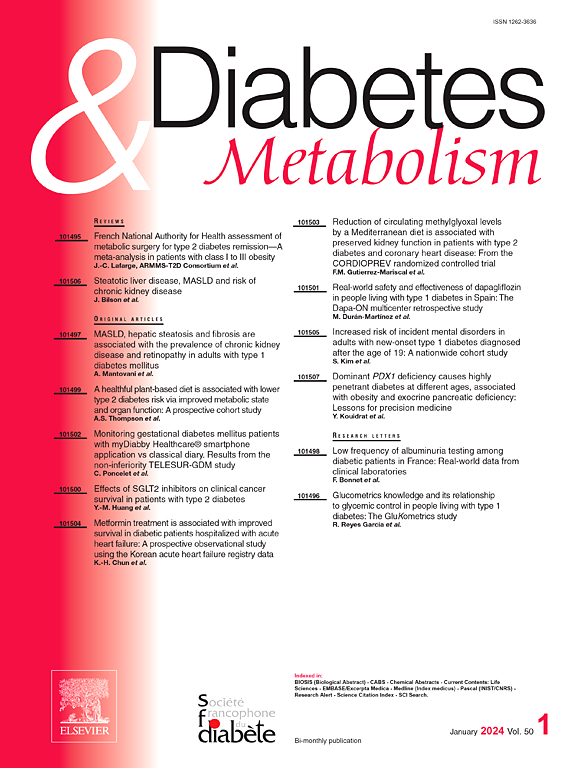Low hemoglobin, even within the normal range, is associated with diabetic kidney disease
IF 4.7
2区 医学
Q1 ENDOCRINOLOGY & METABOLISM
引用次数: 0
Abstract
Aim
To investigate the association between hemoglobin (Hb) levels and incident diabetic kidney disease (DKD) in patients with type 2 diabetes.
Methods
This retrospective cohort study included 1,657 patients with diabetes, without DKD at baseline, recruited from six clinics affiliated with Lee's United Clinic in Taiwan. Demographic data and laboratory results were collected and analyzed. Participants were stratified into quartiles based on their baseline Hb levels. A subgroup analysis was conducted specifically for patients with normal Hb levels (men: Hb ≥ 120 g/l, women: Hb ≥ 110 g/l). Cox regression analysis assessed the relation between Hb levels and incident DKD, adjusting for relevant covariates.
Results
Among the initial cohort, 93 (5.6 %) had anemia at baseline. Over an average follow-up period of 5.7 ± 2.6 years, 594 patients (35.8 %) developed DKD. Cox regression analysis revealed that, after adjusting for multiple variables, compared with patients in the highest quartile of baseline Hb levels (Q4: Hb ≥ 154 g/l), the hazard of DKD was 1.6 times higher in the lowest quartile (Q1: Hb ≤ 130 g/l) HR [95 % CI] 1.58 [1.19;2.21] P < 0.001. In patients with normal Hb levels, Cox regression analysis also revealed that compared to the highest quartile (Q’4, Hb ≥ 154 g/l) the hazard of developing DKD was 1.3 times higher in the lowest quartile (Q’1, Hb ≤ 132 g/l) HR [95 % CI ] 1.29 [1.08;1.72] P = 0.042.
Conclusions
Lower Hb is associated with incident DKD, even in patients with normal Hb levels, independent of other risk factors.
血红蛋白低,即使在正常范围内,也与糖尿病肾病有关。
目的:研究 2 型糖尿病患者的血红蛋白(Hb)水平与糖尿病肾病(DKD)之间的关系:这项回顾性队列研究纳入了从台湾李氏联合诊所下属六家诊所招募的 1,657 名糖尿病患者,这些患者基线时没有糖尿病肾病。研究人员收集并分析了人口统计学数据和实验室结果。根据基线血红蛋白水平将参与者分为四等分。专门针对 Hb 水平正常的患者(男性:Hb ≥ 120 克/升,女性:Hb ≥ 110 克/升)进行了亚组分析。Cox回归分析评估了Hb水平与DKD发病率之间的关系,并对相关协变量进行了调整:在初始队列中,93 人(5.6%)在基线时患有贫血。在平均 5.7 ± 2.6 年的随访期间,594 名患者(35.8%)出现了 DKD。Cox 回归分析显示,在对多种变量进行调整后,与基线 Hb 水平最高四分位数(Q4:Hb ≥ 154 g/l)的患者相比,最低四分位数(Q1:Hb ≤ 130 g/l)的 DKD 危险性高出 1.6 倍(HR [95% CI] 1.58 [1.19-2.21] P < 0.001)。在 Hb 水平正常的患者中,Cox 回归分析还显示,与最高四分位数(Q'4,Hb ≥ 154 g/l)相比,最低四分位数(Q'1,Hb ≤ 132 g/l)的 DKD 患病风险高出 1.3 倍:81.29 [1.08;1.72] P = 0.042.结论:即使是 Hb 水平正常的患者,较低的 Hb 也与 DKD 的发生有关,与其他风险因素无关。
本文章由计算机程序翻译,如有差异,请以英文原文为准。
求助全文
约1分钟内获得全文
求助全文
来源期刊

Diabetes & metabolism
医学-内分泌学与代谢
CiteScore
12.00
自引率
4.20%
发文量
86
审稿时长
13 days
期刊介绍:
A high quality scientific journal with an international readership
Official publication of the SFD, Diabetes & Metabolism, publishes high-quality papers by leading teams, forming a close link between hospital and research units. Diabetes & Metabolism is published in English language and is indexed in all major databases with its impact factor constantly progressing.
Diabetes & Metabolism contains original articles, short reports and comprehensive reviews.
 求助内容:
求助内容: 应助结果提醒方式:
应助结果提醒方式:


